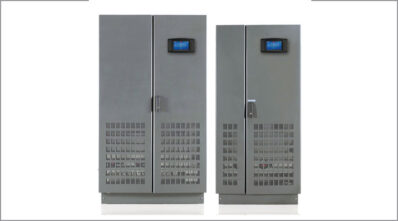A proper UPS battery is critical for an interrupted power supply
By EPR Magazine Editorial March 11, 2023 12:11 pm IST
By EPR Magazine Editorial March 11, 2023 12:11 pm IST

There is no such thing as “the best” UPS battery technology. Every technique has advantages and disadvantages, and it is up to each data centre operator to select the one that best matches their needs. The following information describes the three primary types of UPS batteries and their features.
The significance of Lead-acid UPS batteries
Uninterruptible power supply (UPS) batteries made of lead-acid (LA) continue to be favoured because of their long history of dependability. They are the most cost-effective option for higher-power applications when weight is less of an issue. These UPS battery systems have low internal impedance, a high tolerance for poor handling, great performance, and affordable purchase prices.
They use an electrolyte comprising water, sulfuric acid, and plates of sponge lead (the negative electrode) and lead oxide (the positive electrode). The two main LA uninterruptible power supply battery types are valve-regulated lead-acid (VRLA), also known as “sealed” or “maintenance-free,” and flooded LA batteries, also known as “vented” or “open.”
Valve-Regulated Lead-Acid UPS Battery (VRLA)
VRLA UPS batteries are sealed and can be mounted in any orientation. The uninterruptible power supply battery case is equipped with a valve that vents any gas buildup into the atmosphere. They usually require no direct maintenance; no water top-ups are necessary, as any hydrogen released during charging is recombined internally with oxygen to form water. There are two main VRLA types, distinguished by their electrolyte composition: absorbent glass material (AGM), where the electrolyte is held within a highly porous microfiber glass separator, and gel, which has an electrolyte gel made from a mixture of sulfuric acid and silica.
UPS power supply applications typically use the VRLA AGM type because of its lower internal resistance, high specific power and efficiency, low self-discharge, and lower purchasing cost. AGM uninterruptible power supply batteries charge more quickly and can deliver a high current for a short period.
Feeding or changing the water in flooded lead-acid UPS batteries
Flooded LA batteries have plates that are immersed in an acid electrolyte. Since they are not sealed, the hydrogen generated during operation escapes directly into the environment, so ventilation systems must be more potent than those for VRLA and sized adequately. Usually, the UPS battery banks are accommodated in a dedicated room. Flooded, uninterruptible power supply batteries must be kept and operated upright, and their water levels must be manually topped up.
They provide a longer lifespan and higher reliability than sealed LA batteries. LA battery rooms must be kept at a reasonably constant temperature (20–25°C) to avoid reducing service life or even causing damage.

Lithium-Ion UPS Batteries
The “cathode” is usually a metal oxide in Li-ion batteries, while the “anode” is usually porous carbon graphite. Both are immersed in a liquid lithium salt electrolyte and an organic solvent.
Choosing between these depends on several factors. A precise comparison is impossible since many aspects, such as mechanical form, cell size, and active material mix, play a significant role in performance.
The distinction between Li-ion and lead-acid batteries in UPS
Li-ion UPS batteries are becoming an increasingly attractive alternative to LA in data centre operations, where power availability has the absolute highest priority, and they offer higher reliability than VRLA solutions. Not only is each cell inherently safer and more stable, but each uninterruptible power supply battery module has an electronic controller that continuously checks every cell for any sign of change in performance.
Single-cell temperature, current, voltage, and charge status are monitored at the cabinet level to provide a clear overview of the current uninterruptible power supply battery status and predict future runtime and performance. Lithium-ion UPS batteries can be charged much faster than conventional batteries, offer more discharge and recharge cycles than traditional batteries, and provide higher power density and efficiency, especially under heavy discharge. This eliminates battery oversizing while requiring much less real estate for the battery installation. Although VRLA initial purchase prices are lower, Li-ion UPS battery operating life is at least double that of VRLA equivalents, reducing the overall capital cost. The labour costs associated with UPS battery removal and replacement are also reduced. Li-ion produces less waste heat, lowering cooling costs and creating a smaller carbon footprint.
Nickel-Cadmium UPS Batteries
Nickel-cadmium (NiCd) UPS battery electrodes comprise nickel hydroxide (positive plate) and cadmium hydroxide (negative plate). NiCd uninterruptible power supply batteries provide a very long calendar life (up to 20 years) and can cope with temperature extremes (-20 °C to +40 °C). They also offer a high cycle life and good tolerance for deep discharges. Other benefits relate to the low internal resistance, which offers high power density and fast-charging capability. NiCd batteries offer long storage times and provide increased protection against improper treatment.
Challenges of using nickel-cadmium batteries in UPS systems
NiCd UPS batteries cost much more than their traditional VRLA equivalents. Furthermore, as nickel and cadmium are toxic, UPS battery disposal and recycling are costly. NiCd uninterruptible power supply batteries also require maintenance by topping up with water, especially in high-cycle applications or under heavy charging rates with some charging methodologies.
(For details, please visit kohler-ups.co.uk)
We use cookies to personalize your experience. By continuing to visit this website you agree to our Terms & Conditions, Privacy Policy and Cookie Policy.